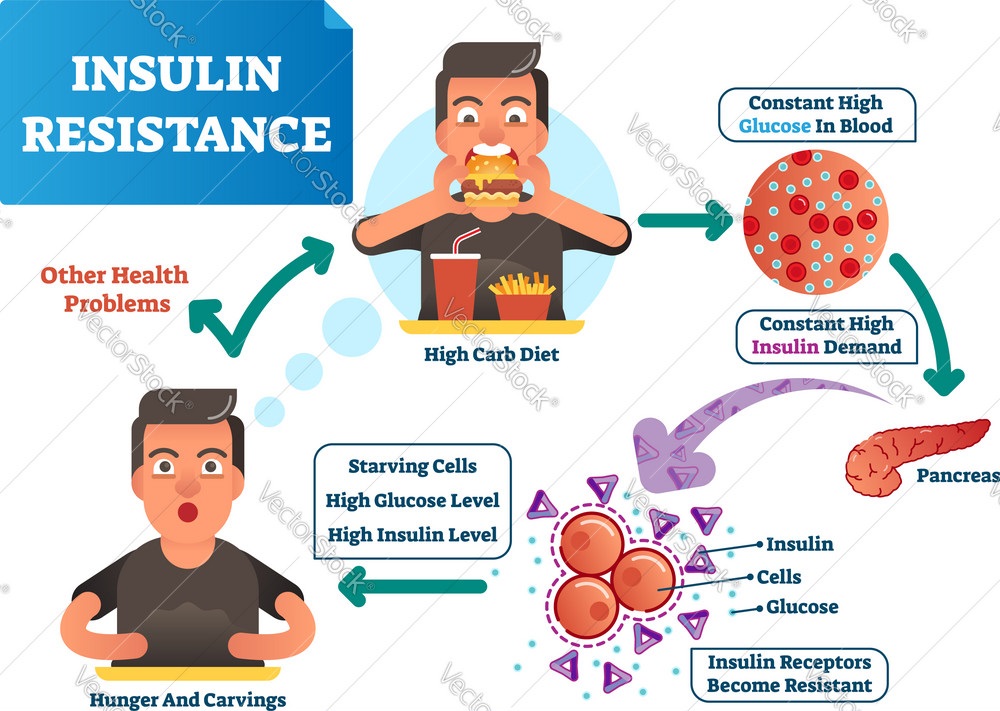We have discussed insulin resistance & sensitivity in our previous blog. Briefly, Insulin is a hormone made in pancreas used to regulate blood sugar levels & use the same to generate energy. We encounter insulin resistance when our body does not produce enough insulin which directly impacts various metabolic functions. In turn this creates difficulty in absorbing glucose & sugar accumulation in our blood stream. This increase in the blood sugar level is not that much to create diabetes. This is called pre-diabetes stage. However the tricky part sometimes is it does not trigger symptoms. You may be insulin resistant & you may not even know. Sometimes a simple blood sugar test cannot tell you if you are insulin resistant.
Early indications can be weight gain specifically around your waistline, big belly, thick neck, big hump on the back of neck & double chin but thin arm & legs. Some of other symptoms include:
- Lethargy
- Hunger
- Lack of concentration
- High Blood Pressure.
- Increases urination – more at night.
- Unusual exhaustion.
The question arises do our genes play a role in causing this chronic/potential chronic disease?
The insulin secretion process is driven by the GIPR gene. Certain variants or genotypes of this gene can interfere with insulin function resulting in hampering various metabolic functions.
GIPR gene is responsible for encoding GIPR protein (gastric inhibitory polypeptide receptor). This protein & GIPR gene play an important role in the insulin production in our body. Certain variants of this gene can impact the body’s ability to secrete insulin. These variants may be associated with insulin resistance, obesity & diabetes.
R in the GIPR gene acts as a receptor for GIP protein. The GIP protein belongs to a class of hormones called incretins which are responsible for regulating blood sugar levels. When glucose (blood sugar level) becomes high due to consumption of a meal/snack, this GIP is secreted by special intestinal cells called K cells. This new GIP binds with GIPR genes in Pancreas which enables insulin secretion. Insulin allows your body to use or store glucose which helps regulate glucose levels.
As shared above, some variants of GIPR impact insulin level & may cause insulin resistance. Why does this happen? The primary function of GIPR along with GIP protein is to stimulate production of insulin in response to the rise of blood sugar level. Certain variants can impair this function leading to reduction in insulin secretion. This can hinder your body’s ability to process glucose leading to increased glucose levels & leading to Obesity &/or diabetes.
Let us talk about these specific variants. One of the detailed research on SNP in the GIPR gene is rs10423928. There are two alleles for this variant – the more common “T” & less common “ A”.
Having T allele leads to normal gene function however if you have A allele, it can result in reduced insulin secretion function. A allele is moderately associated with type 2 diabetes.
Two alleles in the rs2302382 variant are “C” allele & “A” allele. “ A” allele is linked to metabolic disorder primarily due to impaired insulin secretion.
Discover your personal trait to figure out if you are genetically predisposed to insulin resistance. We use genetic traits & insights to provide a comprehensive & personalised fitness solution through our live online fitness coaching. Whether you are a corporate employee, a homemaker or someone looking to have an athletic build, our personalised solution ,delivered by our international certified fitness coaches, will help you achieve your fitness goals. Sign up here.


Leave a Reply